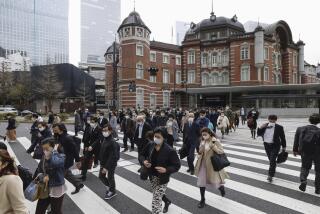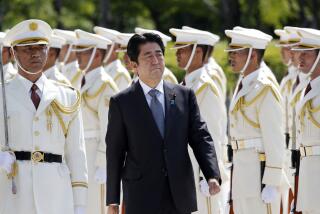Ruling on Japanese Flag Recalls Anguish of WWII
- Share via
TOKYO — For the first time ever, a Japanese court ruled Tuesday that the red sun flag has been accepted by the people as Japan’s official national flag.
The ruling again underscores the psychological scars of World War II that remain in Japanese minds 48 years after the nation’s defeat. It also promises to rekindle a battle over limits on freedom of expression.
The Naha District Court on the island of Okinawa handed down the decision, giving Shoichi Chibana, 44, a grocer in Yomitan, a suspended sentence for tearing down and burning a hinomaru (red sun) flag at the opening ceremony of a national athletic meet in 1987.
Yomitan was one of the sites at which American troops landed in 1945 in the bloodiest land battle of the Pacific theater during World War II.
Chibana argued that many Japanese on Okinawa, the only part of Japan itself ever to suffer a foreign invasion, still consider the flag “a loathsome symbol” of wartime militarism and the sacrifices that Okinawans were called upon to make for the mainland.
The grocer, who has been active in campaigns against U.S. military bases in Okinawa, cited the mass suicide of 82 Yomitan civilians that the Japanese army ordered as a gesture of loyalty to the emperor during the 1945 battle.
Judge Keiichi Miyagi acknowledged that no law exists specifying either a national flag or unacceptable behavior toward such an emblem. But he ruled that the Japanese public has come to accept the red sun flag as the national banner.
Prosecutors charged Chibana with destroying a public “utensil,” but at the trial they specified that the “utensil” was the national flag.
Although flag-burning also has stirred controversy in the United States, American courts have ruled that such action is protected by constitutional guarantees of freedom of expression.
Miyagi said Chibana held “understandable” resentment against the red sun flag because of the coerced mass suicide in Yomitan. But he said the grocer should not have resorted to physical disruption of the athletic meeting to express his views.
Apparently under pressure from conservative groups, Yomitan’s mayor, who had also objected to raising the flag at the meet, refused to testify for Chibana in the trial.
“The court had no intention of understanding a legitimate act of an ordinary person. I am burning with anger,” Chibana told reporters afterward. He said he plans to appeal.
The display of the red sun flag and the singing of a hymn to the emperor that is recognized as the national anthem have divided public opinion since the end of World War II. It was not until 1991 that the Education Ministry ordered schools to include both in graduation ceremonies.
More to Read
Sign up for Essential California
The most important California stories and recommendations in your inbox every morning.
You may occasionally receive promotional content from the Los Angeles Times.













